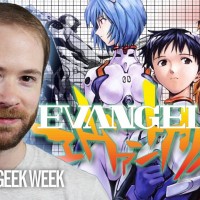Idea Channel on Evangelion, the Death of the Author, and the Overthinking of Pop Culture
By The Eva Monkey on Saturday, August 26th, 2017
PBS’s Idea Channel is coming to a close after five years of diving deep into and sharing ideas about pop culture on YouTube. One of their final few videos, on the overthinking of popular culture, is a topic that has always been a concern of mine. Quite often I find myself, as an Evangelion fan, concerned about society’s judgments, because I put a significant amount of time and effort into discussing, researching, writing, and speaking about an anime. I can’t separate myself from the fact that it is a cartoon, and even though anime as a medium is much less stigmatized now than when I was introduced to it in the late 90s, I can’t escape the fact that I acclimated myself to the medium during high school, a time when there was even greater criticism of my identity and interests. For that, I am extremely guarded about my fandom, particularly in professional or “adult” situations. There’s a lot to think about with the validity of studying younger artistic mediums like comics, anime, and videos games, and I think Idea Channel’s defense of overthinking pop culture is extremely relevant to Evangelion fans in particular. Evangelion is even mentioned, though briefly, in the video.
 It is also worth mentioning that Idea Channel initially crossed my radar several years back when they produced a video examining Evangelion as a representation of the death of the author. The video provided some interesting material on a subject that I unfortunately haven’t studied, and could certainly benefit to, as it is quite relevant to the study of Evangelion. However, there was one thing that was unfortunately overlooked in the production of the episode. Regardless of whether it is something to be agreed with or not, Hideaki Anno himself, as far back as 1996 has effectively said as much, that while Evangelion is a reflection of himself, it is also open to personal interpretation. At his panel at Anime Expo in 1996, Anno had this to say about Neon Genesis Evangelion:
It is also worth mentioning that Idea Channel initially crossed my radar several years back when they produced a video examining Evangelion as a representation of the death of the author. The video provided some interesting material on a subject that I unfortunately haven’t studied, and could certainly benefit to, as it is quite relevant to the study of Evangelion. However, there was one thing that was unfortunately overlooked in the production of the episode. Regardless of whether it is something to be agreed with or not, Hideaki Anno himself, as far back as 1996 has effectively said as much, that while Evangelion is a reflection of himself, it is also open to personal interpretation. At his panel at Anime Expo in 1996, Anno had this to say about Neon Genesis Evangelion:
“Evangelion is like a puzzle, you know. Any person can see it and give his/her own answer. In other words, we’re offering viewers to think by themselves, so that each person can imagine his/her own world. We will never offer the answers, even in the theatrical version. As for many Evangelion viewers, they may expect us to provide the ‘all-about Eva’ manuals, but there is no such thing. Don’t expect to get answers by someone. Don’t expect to be catered to all the time. We all have to find our own answers.”
—Protoculture Addicts #43, translated by Miyako Graham from the November 1996 issue of Newtype
I feel like this is the sort of source that would be the cornerstone of a video about this topic, but it was unfortunately overlooked, or at the very least, escaped mention. Nevertheless, I think the video is a good conversation starter among Evangelion fans on the subject of interpretation and meaning.
Despite my criticism of their video on Evangelion, Idea Channel has produced some really thought-provoking content over the years, and I bid them a fond farewell. Check out their YouTube channel sometime, and wish them well on Twitter.
Sources:
- Idea Channel: “Does It Matter What Evangelion’s Creator Says?”
- Idea Channel: Comment Response to “Does It Matter What Evangelion’s Creator Says?”
- Idea Channel: “A Defense of Overthinking Pop Culture”
- Lawrence Eng: “In the Eyes of Hideaki Anno, Writer and Director of Evangelion”
